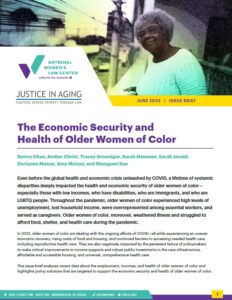 Even before the global health and economic crisis unleashed by COVID, a lifetime of systemic disparities deeply impacted the health and economic security of older women of color—especially those with low incomes, who have disabilities, who are immigrants, and who are LGBTQ people. Throughout the pandemic, older women of color experienced high levels of unemployment, lost household income, were overrepresented among essential workers, and served as caregivers. Older women of color, moreover, weathered illness and struggled to afford food, shelter, and health care during the pandemic.
Even before the global health and economic crisis unleashed by COVID, a lifetime of systemic disparities deeply impacted the health and economic security of older women of color—especially those with low incomes, who have disabilities, who are immigrants, and who are LGBTQ people. Throughout the pandemic, older women of color experienced high levels of unemployment, lost household income, were overrepresented among essential workers, and served as caregivers. Older women of color, moreover, weathered illness and struggled to afford food, shelter, and health care during the pandemic.
In 2023, older women of color are dealing with the ongoing effects of COVID—all while experiencing an uneven economic recovery, rising costs of food and housing, and continued barriers to accessing needed health care, including reproductive health care. They are also negatively impacted by the persistent failure of policymakers to make critical improvements to income supports and robust public investments in the care infrastructure, affordable and accessible housing, and universal, comprehensive health care.
This issue brief, co-authored by NWLC and Justice In Aging, analyzes recent data about the employment, incomes, and health of older women of color and highlights policy solutions that are targeted to support the economic security and health of older women of color. It updates an issue brief originally published in October 2021.

